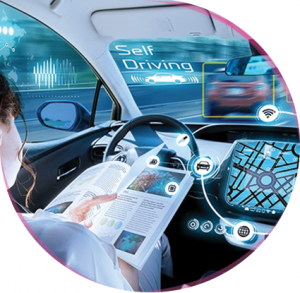It can be argued that self-drive cars could reduce the number of road traffic accidents as the concept of “human error” will no longer be a risk. “Human error” is said to be the cause of 90% of road accidents, so removing this risk should ultimately reduce the risk of an accident to 10%.
Nevertheless, the full automation of vehicles could be very dangerous, and if technology fails us, we need to know who will be deemed liable. Over reliance on an automated vehicle could lead to a lack of concentration and awareness, therefore, increasing the risk of an accident occurring. One issue which could arise is that if the backup driver is unaware of the situation on the roads and an accident occurs, they will need to react quickly to understand and respond to the situation. A self-drive car uses sensors, radars, and cameras to brake, stop, change lanes and reverse without the help of a human driver, but what if the technology glitched, as technology often does? It is interesting that research has found that only 8% of UK drivers would feel safe in a self-drive car.
In 2018 a self-driving Volvo Uber hit a pedestrian whilst driving at 39mph, despite a safety driver being present. The back up driver was charged with negligent homicide as it was established that she had the ability to take over control of the vehicle in an emergency. The fatal collision was classified as "entirely avoidable" if the driver had been watching the road. Nevertheless, it was found that the vehicle's automatic systems failed to identify the pedestrian who was crossing the road as an imminent collision danger. Uber did not face criminal charges, as there was "no basis for criminal liability" for the corporation.
It can be said that if "self-driving" cars still need a human safety driver to be present, there will be confusion about who will be deemed responsible when something goes wrong. When the time comes to introduce fully automated cars to the roads and an accident occurs, it must be clearly distinguished whether the accident was due to human error or the technology. Where the driver is said to be at fault, the claims process should proceed as it does currently. It can be said that if we experience a reduction in the number of road traffic accident claims, we may see an increase in the number of claims for product liability against technology manufacturers.
It is difficult to assess whether the impact of self-drive cars will be either positive or negative. As we draw closer to the introduction of such technology there are many concepts which still need to be established before it becomes a reality to ensure that victims of accidents are not left in the dark.
Facing a Personal Injury Claim can be a confusing time, which is why it is best to instruct a Personal Injury Lawyer who can help you to pursue your claim. If you have suffered an injury due to an accident which was not your fault, our Lincolnshire based Personal Injury Solicitors can help you to obtain the compensation, treatment and rehabilitation you need for your recovery. Our Team have over 39 years’ experience in helping victims of Road Traffic Accidents in the East Midlands, and rural Lincolnshire to include Skegness, Boston, Louth, Grimsby, and Lincoln. Our Personal Injury Team will be happy to help you with any queries you may have. To get in touch submit a contact form now to request a call back or call us directly on 01754 897150.

